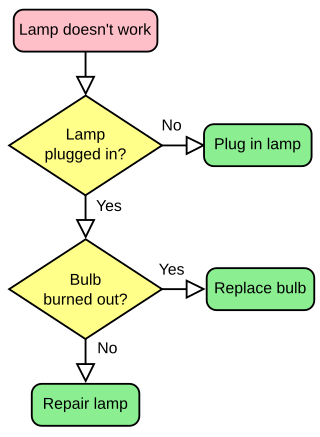Rational choice theory refers to a set of guidelines that help understand economic and social behaviour. The theory originated in the eighteenth century and can be traced back to political economist and philosopher, Adam Smith. The theory postulates that an individual will perform a cost-benefit analysis to determine whether an option is right for them. It also suggests that an individual's self-driven rational actions will help better the overall economy. Rational choice theory looks at three concepts: rational actors, self interest and the invisible hand.
Rationality is the quality of being guided by or based on reason. In this regard, a person acts rationally if they have a good reason for what they do or a belief is rational if it is based on strong evidence. This quality can apply to an ability, as in a rational animal, to a psychological process, like reasoning, to mental states, such as beliefs and intentions, or to persons who possess these other forms of rationality. A thing that lacks rationality is either arational, if it is outside the domain of rational evaluation, or irrational, if it belongs to this domain but does not fulfill its standards.
Bounded rationality is the idea that rationality is limited when individuals make decisions, and under these limitations, rational individuals will select a decision that is satisfactory rather than optimal.

Behavioral economics studies the effects of psychological, cognitive, emotional, cultural and social factors in the decisions of individuals or institutions, and how these decisions deviate from those implied by classical economic theory.

Pascal's wager is a philosophical argument advanced by Blaise Pascal (1623–1662), a notable seventeenth-century French mathematician, philosopher, physicist, and theologian. This argument posits that individuals essentially engage in a life-defining gamble regarding the belief in the existence of God.

In psychology, decision-making is regarded as the cognitive process resulting in the selection of a belief or a course of action among several possible alternative options. It could be either rational or irrational. The decision-making process is a reasoning process based on assumptions of values, preferences and beliefs of the decision-maker. Every decision-making process produces a final choice, which may or may not prompt action.

Decision theory is a branch of applied probability theory and analytic philosophy concerned with the theory of making decisions based on assigning probabilities to various factors and assigning numerical consequences to the outcome.

A choice is the range of different things from which a being can choose. The arrival at a choice may incorporate motivators and models.
The expected utility hypothesis is a foundational assumption in mathematical economics concerning human preference when decision making under uncertainty. It postulates that a rational agent maximizes utility, as formulated in the mathematics of game theory, based on their risk aversion. Rational choice theory, a cornerstone of microeconomics, builds upon the expected utility of individuals to model aggregate social behaviour.

Buridan's ass is an illustration of a paradox in philosophy in the conception of free will. It refers to a hypothetical situation wherein an ass (donkey) that is equally hungry and thirsty is placed precisely midway between a stack of hay and a pail of water. Since the paradox assumes the donkey will always go to whichever is closer, it dies of both hunger and thirst since it cannot make any rational decision between the hay and water. A common variant of the paradox substitutes the hay and water for two identical piles of hay; the ass, unable to choose between the two, dies of hunger.
Status quo bias is an emotional bias; a preference for the maintenance of one's current or previous state of affairs, or a preference to not undertake any action to change this current or previous state. The current baseline is taken as a reference point, and any change from that baseline is perceived as a loss or gain. Corresponding to different alternatives, this current baseline or default option is perceived and evaluated by individuals as a positive.
Libertarian paternalism is the idea that it is both possible and legitimate for private and public institutions to affect behavior while also respecting freedom of choice, as well as the implementation of that idea. The term was coined by behavioral economist Richard Thaler and legal scholar Cass Sunstein in a 2003 article in the American Economic Review. The authors further elaborated upon their ideas in a more in-depth article published in the University of Chicago Law Review that same year. They propose that libertarian paternalism is paternalism in the sense that "it tries to influence choices in a way that will make choosers better off, as judged by themselves" ; note and consider, the concept paternalism specifically requires a restriction of choice. It is libertarian in the sense that it aims to ensure that "people should be free to opt out of specified arrangements if they choose to do so". The possibility to opt out is said to "preserve freedom of choice". Thaler and Sunstein published Nudge, a book-length defense of this political doctrine, in 2008.
Robert N. Audi is an American philosopher whose major work has focused on epistemology, ethics, rationality and the theory of action. He is O'Brien Professor of Philosophy at the University of Notre Dame, and previously held a chair in the business school there. His 2005 book, The Good in the Right, updates and strengthens Rossian intuitionism and develops the epistemology of ethics. He has also written important works of political philosophy, particularly on the relationship between church and state. He is a past president of the American Philosophical Association and the Society of Christian Philosophers.

Predictably Irrational: The Hidden Forces That Shape Our Decisions is a 2008 book by Dan Ariely, in which he challenges readers' assumptions about making decisions based on rational thought. Ariely explains, "My goal, by the end of this book, is to help you fundamentally rethink what makes you and the people around you tick. I hope to lead you there by presenting a wide range of scientific experiments, findings, and anecdotes that are in many cases quite amusing. Once you see how systematic certain mistakes are—how we repeat them again and again—I think you will begin to learn how to avoid some of them".
Choice architecture is the design of different ways in which choices can be presented to decision makers, and the impact of that presentation on decision-making. For example, each of the following:
Heuristics is the process by which humans use mental shortcuts to arrive at decisions. Heuristics are simple strategies that humans, animals, organizations, and even machines use to quickly form judgments, make decisions, and find solutions to complex problems. Often this involves focusing on the most relevant aspects of a problem or situation to formulate a solution. While heuristic processes are used to find the answers and solutions that are most likely to work or be correct, they are not always right or the most accurate. Judgments and decisions based on heuristics are simply good enough to satisfy a pressing need in situations of uncertainty, where information is incomplete. In that sense they can differ from answers given by logic and probability.
In economics and other social sciences, preference refers to the order in which an agent ranks alternatives based on their relative utility. The process results in an "optimal choice". Preferences are evaluations and concern matter of value, typically in relation to practical reasoning. An individual's preferences are determined purely by a person's tastes as opposed to the good's prices, personal income, and the availability of goods. However, people are still expected to act in their best (rational) interest. In this context, rationality would dictate that an individual will select the option that maximizes self-interest when given a choice. Moreover, in every set of alternatives, preferences arise.
In psychology, economics and philosophy, preference is a technical term usually used in relation to choosing between alternatives. For example, someone prefers A over B if they would rather choose A than B. Preferences are central to decision theory because of this relation to behavior. Some methods such as Ordinal Priority Approach use preference relation for decision-making. As connative states, they are closely related to desires. The difference between the two is that desires are directed at one object while preferences concern a comparison between two alternatives, of which one is preferred to the other.
Laurie Ann Paul is a professor of philosophy and cognitive science at Yale University. She previously taught at the University of North Carolina at Chapel Hill and the University of Arizona. She is best known for her research on the counterfactual analysis of causation and the concept of "transformative experience."
Negative utilitarianism is a form of negative consequentialism that can be described as the view that people should minimize the total amount of aggregate suffering, or that they should minimize suffering and then, secondarily, maximize the total amount of happiness. It can be considered as a version of utilitarianism that gives greater priority to reducing suffering than to increasing pleasure. This differs from classical utilitarianism, which does not claim that reducing suffering is intrinsically more important than increasing happiness. Both versions of utilitarianism hold that morally right and morally wrong actions depend solely on the consequences for overall aggregate well-being. "Well-being" refers to the state of the individual.







